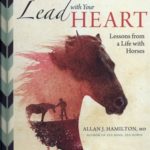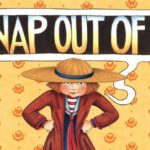
Palomino mare Miss Goldwood Five lived for speed. Whether it was running barrels or team penning, she loved to kick it into high gear.
Sounds like a lot of Quarter Horses you know, right?
What made ?Goldie? different was that she was completely blind.
Kris Klasen of Bemidji, Minnesota, purchased the Doc Bar granddaughter while on vacation in Florida in 1995. With less than an hour to kill before heading to the airport to catch her flight home, Kris stopped at a riding stable with a sign, ?Horses for sale.? Kris saw Goldie, looked at her for 10 minutes and bought her on the spot.
Goldie was blind in one eye when Kris purchased her, but Kris didn’t find that out until the horse was shipped to her Minnesota home. Had she known, Kris says, she still would have bought the mare, who was intended as a 4-H horse for Kris? 8-year-old-son, Casey.
The first summer at her new home, Goldie injured her other eye while out in the pasture and became completely blind. But the Klasens were not fazed, and Casey and his brother, Josh, continued to show and trail ride Goldie, winning high-point awards in the Minnesota Palomino Horse Exhibitors and 4-H.
?She absolutely trusted Casey,? Kris says. ?And he learned to be incredibly responsible because she was totally dependent on him.?
The Klasens found that caring for Goldie was much like caring for any horse.
?Having Goldie wasn?t like having a blind horse,? Kris says. ?We hauled her everywhere. We competed with her and trail rode. She was the most sure-footed of all of our horses.?
Goldie was also the Klasens? best broodmare. She never stepped on a foal, and she was the most level-headed mother.
Kris says the bond you form with a blind horse is a tight-knit relationship built on trust.
?Goldie was so responsive to the rider,? Kris says. ?She listened. She was willing to do anything. She loved to run. She would trot around her pasture, but when someone got on her, she had the freedom to run, because she had someone to tell her where to go.?
The Klasens planned to keep Goldie for the rest of her days, but the Texas-bred and Florida-raised mare never grew a thick winter coat like the Klasens? other horses. As Goldie got older and the winters got harder for her, the family made the difficult decision in 2008 to sell the mare to a warmer home. And Kris knew just the perfect place.
In 2007, the Klasens sold their Quarter Horse gelding? Buttershot, who was blind in one eye, to HorseFriends, a nonprofit foundation that works with mentally and physically disabled children and adults. Not only is HorseFriends in warm Greensboro, North Carolina, but president Emilie Storch also had a passion for blind horses. Luckily, the foundation was looking for one more blind horse to add to its herd of therapy horses.
Emilie?s passion for blind horses began after one was donated to HorseFriends in 2007, and she developed another foundation, Flurry?s Hope, to help educate the public about the usefulness of blind horses.
Emilie says that blind horses, such as Goldie, transfer well into roles as therapy horses because their increased dependence makes them bond quickly to humans. She also says that people with disabilities can relate to horses with disabilities.
When Goldie first arrived at HorseFriends, Emilie wondered if she should prepare the children for the horse’s appearance, in case they were shocked that Goldie was missing one of her eyes.
?I didn’t say anything, and not one child ever said anything about her missing eye,? Emilie says. ?They didn’t worry about her being blind. People with disabilities understand that a disabilityis not an inability ? it’s just something you work around. Other people expect blind horses to be worthless, but here is this beautiful palomino horse who is a fantastic trail horse, plus she’s a therapy horse, plus she was a barrel racer, plus all these other fantastic things.?
HorseFriends has three locations in North Carolina, and Goldie and two other blind horses all resided at the location managed by Emilie, who is also a practicing clinical psychologist. Goldie impressed Emilie during a therapy session that required four side-walkers and a leader to assist a disabled rider.
?I just started to weep, because here is this profoundly handicapped person riding above all these other people, something she has probably never experienced in her life,? Emilie says. ?And teenage volunteers are serving this person, and a blind horse is the one that’s taking them all around. I was weeping in amazement at what God can do-?? this thing that the world would have never allowed to happen. It just speaks to the power of blind horses.?
Sadly, Goldie has passed away since this story was first written, but Emilie says that she had a great life at HorseFriends.
For more information about HorseFriends, visit www.horsefriendsnc.org . Emilie also provides information about blind horses, including training tips, on her website,www.flurryshope.com.







